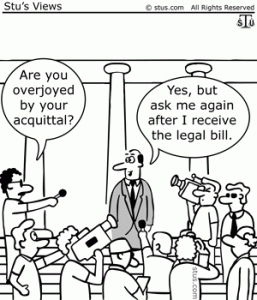 Litigation funding is a topic I have covered from different angles here on Dispute Resolution Germany. As I noted, there is virtually no regulation of third party funding in this country, nor are there civil law equivalents to the common law doctrines champerty and maintenance. So it is interesting to watch, as an interested by-stander, how things develop in England and the United States. Apparently, there are calls for regulation in these jurisdictions that are, rightly or wrongly, percieved by many as more liberal and less regulated than Germany.
Litigation funding is a topic I have covered from different angles here on Dispute Resolution Germany. As I noted, there is virtually no regulation of third party funding in this country, nor are there civil law equivalents to the common law doctrines champerty and maintenance. So it is interesting to watch, as an interested by-stander, how things develop in England and the United States. Apparently, there are calls for regulation in these jurisdictions that are, rightly or wrongly, percieved by many as more liberal and less regulated than Germany.
But apparently, some interest groups see a need for regulation of third party funding: In the London market, litigation funders have formed an association and agreed on a Code of Conduct – I do not know whether that was a preemptive strike to avoid more heavy-handed regulation. And over the pond, the U.S. Chamber of Commerce Institute of Legal Reform last month called for the regulation of third-party litigation funders. In that environment, negative headlines like the one on Axiom Legal Financing Fund, which provided “short term fixed-interest loans to approved law firms to finance specific litigation cases” in late October 2012 are not particularly helpful to the funding industry: “Legal financing fund at centre of allegations suspended.”
The title of the paper published by the U.S. Chamber’s Istitute for Legal Reform is “Stopping the Sale of Lawsuits”. It takes a pretty agressive pro-regulation stance. A opinion piece in The Lawyer this week makes it clear that the U.S. Chamber is calling for regulation not only of its domestic market, but also of the London market. The English Code of Conduct is critizied as vague and lacking meaningful sanctions:
“For too long, funders have tried to exclude policy-makers from the debate on funding and the wider justice system. It is time for funders to accept statutory regulation. Politicians could thus signal that the UK justice system still values justice over cash.”
My take of the debate is rather simple: Litigation funding tends to amplify problems that already exist, rather than to create any real new issues. This would imply that the real need for reguation and reform of the respective litigation system is not litigation funding.
Cartoon copyright and courtesy of Stu.
